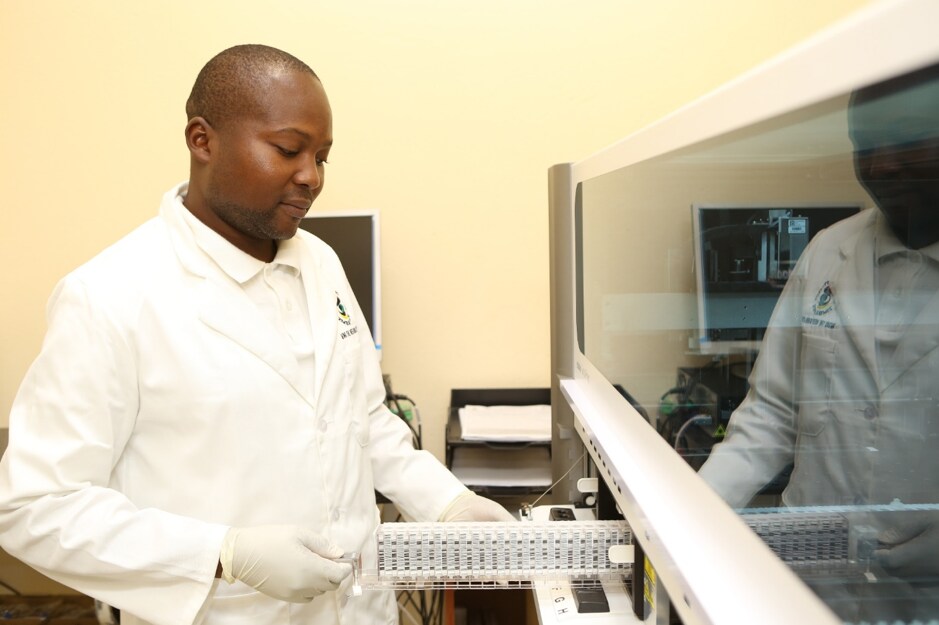Working together to end the AIDS-HIV pandemic

Image: Courtesy Roche
Many of the world’s top relief and aid organizations have united around an ambitious goal: ending the HIV-AIDS pandemic. In Africa, more than 25 million people are living with HIV—a clear sign that improving access to testing and treatment is a critical priority.
Yet in areas hit hardest by HIV—such as the vast sub-Saharan region—access to healthcare centres able to diagnose, treat and provide follow-up HIV patient care is extremely limited. Worldwide, many people living with HIV still do not know their status. Roche’s Global Access Program was established to expand access to quality, sustainable diagnostic testing and to contribute to the UNAIDS 90-90-90 goal. UNAIDS is targeting 2020 as the year in which 90 percent of people living with HIV will know their status, 90 percent of those diagnosed with HIV will receive sustained antiretroviral therapy and 90 percent of all being treated will have viral suppression, which means the disease is being monitored and is under control and less likely to spread—an important step towards ending the pandemic.
To bring HIV testing to people living in isolated parts of the world—even in areas of intense heat and humidity—we created the cobas Plasma Separation Card for HIV plasma viral load testing. The size of a credit card, it fundamentally changes the way samples are taken, transported and processed for HIV testing, allowing more people to be tested, treated and monitored.
The cobas Plasma Separation Card illustrates our purpose of making a meaningful, positive difference in the lives of patients, their families and society at large. It also serves as an example of what I believe should be the true measure of business success: being a net contributor to society and giving back more than we take. This doesn’t mean we eliminate doing well financially—but this is only one component. Benefiting people and the planet are also part of the definition.
We are proud of the impact of the Roche Global Access Program and, based on its success, we have now expanded it to also include hepatitis, tuberculosis and human papillomavirus (HPV) testing. The Global Access Program, however, is not just about diagnostics; it's about going above and beyond to support the strengthening of healthcare systems in low- to middle-income countries. For Roche, this means offering training, partnerships and tests at reduced prices, because accessible pricing can be the difference between a patient getting a quality diagnosis or not.
Our innovative diagnostic tests are only meaningful if they reach the people who need them, when they need them—no matter where they live. Our strong global presence helps meet the increased demand for diagnostic testing and helps healthcare systems address their access challenges.

Importantly, we are not operating in isolation. We work closely with many different partners to continuously and sustainably reduce barriers that may prevent people from being diagnosed or treated. When we created the Global Access Program in 2014, we partnered with national governments, local healthcare facilities, communities and international agencies including UNAIDS, CHAI, Unitaid, the U.S. President’s Emergency Plan for AIDS Relief (PEPFAR), Global Fund, and the Center for Disease Control and Prevention (CDC). In 2018, we launched a Public Private Partnership (PPP) with the Kenya Medical Research Institute by installing our cobas 8800 system for HIV assays.
We continue to build testing capacity for infectious diseases, cancer and other serious health problems. In Africa, the 350 Roche instruments installed in 27 countries have the capacity to run nearly 20 million tests a year.
Building capacity also extends to continuing education and knowledge transfer for laboratory personnel. Through our Roche Scientific Campus located in Johannesburg, we train laboratory scientists in state-of-the-art facilities. In just one year, we trained more than 1,800 people who were then able to train staff in their clinics and hospitals, supporting healthcare system scale-up and helping to improve access to and the quality of healthcare.
I firmly believe it is our responsibility to strengthen the communities in which we operate and support the United Nations’ Sustainable Development Goal to ensure healthy lives and promote well-being for all, at all ages. Major progress has been made in improving the health of millions of people, but we still have much to do. Progress has stalled with regard to addressing major diseases such as tuberculosis and hepatitis; we hope including testing for these diseases in our Global Access Program will help rekindle momentum.
I share the World Economic Forum’s belief progress happens by bringing together people from all walks of life who have the drive and the influence to make positive change. The connections we make here in Cape Town can help us better understand the challenges we face and strengthen our opportunity to be not just a force for good, but a force for sustainable good. Let us carry this commitment forward, turning these ambitious goals into a reality that creates a brighter, healthier future for people and for our planet.
Don't miss any update on this topic
Create a free account and access your personalized content collection with our latest publications and analyses.
License and Republishing
World Economic Forum articles may be republished in accordance with the Creative Commons Attribution-NonCommercial-NoDerivatives 4.0 International Public License, and in accordance with our Terms of Use.
The views expressed in this article are those of the author alone and not the World Economic Forum.
Stay up to date:
Africa
Forum Stories newsletter
Bringing you weekly curated insights and analysis on the global issues that matter.
More on Geographies in DepthSee all
Naoko Tochibayashi
October 30, 2025







